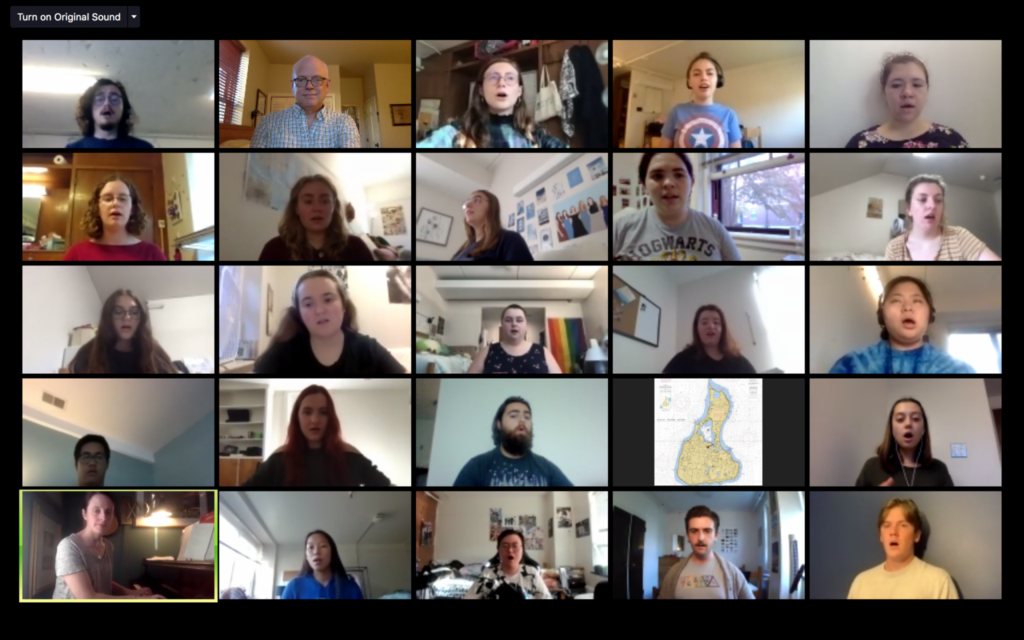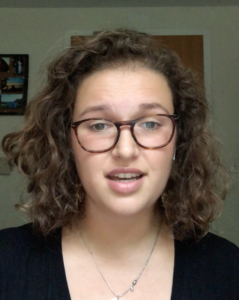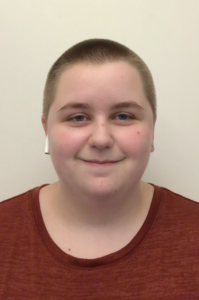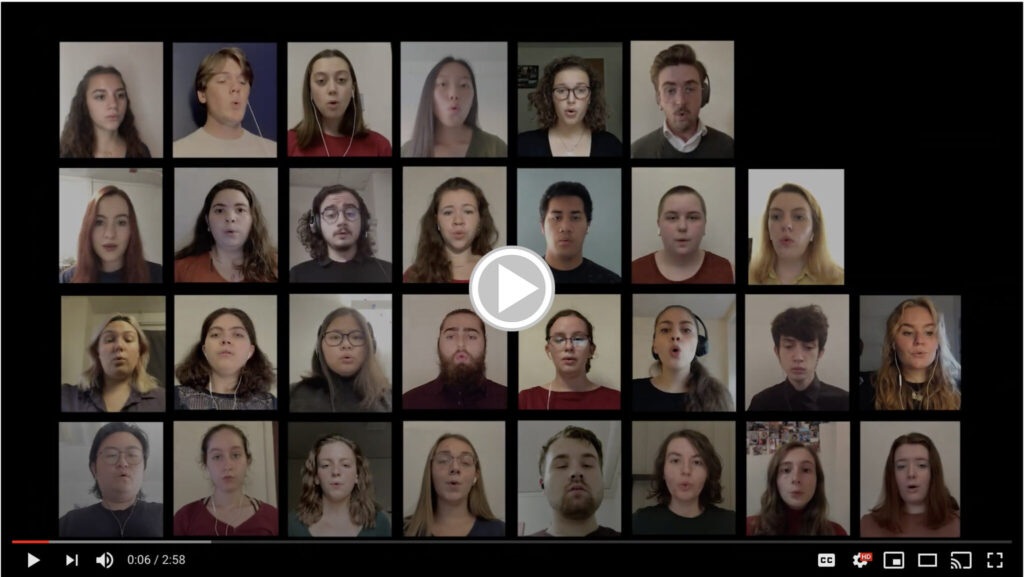In harmony, apart

Wheaton choirs keep the music flowing
For singers in a choir, it’s the beautiful harmonies and thrill of creating music in a group that make the experience so invigorating.
Unfortunately, the act of singing heightens the risk of COVID-19 transmission, according to the Centers for Disease Control and Prevention. Due to this added risk, Wheaton Chorale and Chamber Singers—along with all singing groups on campus—must rehearse virtually this semester. But while the singers may be confined to singing alone in their dorm rooms, apartments and homes off-campus, they are finding ways to connect, assemble recordings and grow as musicians—in some ways that are unexpected.
Tim Harbold, professor of music and choral director at Wheaton, has never experienced anything like this in his 25 years at the college.
In this new virtual environment, his biggest aim is to nurture the feeling of community among the students in the Music Department’s two choral groups. As such, he has set aside more time for talking during group rehearsals to create bonds in the absence of in-person connections.
“Normally in rehearsal when singing together, that sense of community is naturally formed. Now that it’s impossible, we have to be intentional. I’ve invited one student per class to share a piece of music with the group. We listen to the recording, then everyone will comment,” he said.

Jillian Hirst ’21, a music and sociology double major, is currently writing an honors thesis measuring feelings of belonging within an in-person and virtual choir. For her, this semester has not only been interesting as a singer but also as a researcher.
“Professor Harbold has made a point to integrate discussions on a variety of musical topics throughout the semester, from the role of cultural appropriation in music to discussing music TikTok trends in breakout rooms. It is through these discussions that we’ve been able to facilitate a community,” said Hirst, who serves as chorale assistant.
Professor Harbold said he is choosing a musical repertoire with the knowledge that everyone is separate. He carefully selects music in which the elements of a piece aren’t as reliant on a strong group dynamic.
Some aspects of rehearsals remain the same. When students “meet,” they participate in a series of exercises and warmups, and Harbold provides a run-down of the rehearsal plan.
After the warmups, however, he directs the students to rehearse independently, as an audio delay makes it difficult to sing together. Students are tasked with sending the best recordings of their part to the professor.
Harbold notes that the experience of singing alone may reveal areas to improve. “Normally, in a choir setting, you are with other people. If you are a little off, you are not necessarily forced to confront that. Now you can listen to exactly what you did and decide if it’s good enough to record.”
Elio Simpson, a first-year student who previously sang in high school choir groups, described one challenging obstacle: perfectionism.
“Since the recording is my voice alone, I can hear every wrong note and breath in the wrong spot, which can make it difficult for me to feel confident and proud of what I’m accomplishing. In person, a small mistake wouldn’t take away from the overall sound of the rehearsal or performance, but virtually it feels more high stakes,” Simpson said.

However, there are many unexpected benefits.
“I really enjoy that I can move at my own pace, and choose which pieces I personally need to spend more time on in order to learn my part. In person, the rehearsal would include going over other voice parts, so that time that I would usually spend waiting to rehearse my part or as a full choir can be spent learning my part in this new independent format,” Simpson said.
For Hirst, who is a soloist for both Wheaton Chorale and Chamber Singers, rehearsing alone has brought her back to the basics.
“I have been able to focus on singing just for the joy of making music. I have been able to hone my critical listening skills as well as work on some ear-training skills that I would not have been able to utilize in the same way if I was in person,” she said. “When recording yourself singing a song, it is very easy to get overly critical of yourself because you have the ability to go back and listen to how you sound. Through this process, I have been able to learn how to utilize multiple takes as a learning tool to grow as a musician.”
Choir members are getting increasingly acclimated to the technical side of virtual rehearsals. Harbold provides practice files of actual singers for the students to learn the music, and works with them to determine the optimal environment and tools to submit the best recordings.
Now he is collaborating with the choirs on a number of projects. The Chorale’s first project was a homecoming piece called “The Road Home,” which was made into a video with the students’ individual submissions. The students recorded their work over a guide track that included a recording provided by Hirst, a soprano.
With both groups, Harbold is working on the highlight event of the semester: the Vespers concert, which will translate the long-standing college tradition, with its wide range of musical styles, into a virtual environment.
The concert will include at least one piece recorded in person by musicians. For one selection, singers will record over an accompaniment track provided by the Wheaton Sinfonietta (led by Del Case, associate professor of music), which will perform the piece in Cole Memorial Chapel for the recording session.
Harbold is using Logic Pro digital audio software to assemble, align and edit the audio tracks. In Adobe Premiere Pro, he layers and synchronizes the video tracks, combining them with the final audio mix, and with additional video and images.
“We’re trying to stay true to the mission of the Vespers concert,” he said.
In the meantime, virtual music-making is still generating the simple joy of group performance.
“I am enjoying being part of Chorale and Chamber Singers in the virtual format, even though it’s very different from being in person. I still get to see everyone’s smiling faces and share laughter and joy with my fellow singers, even if over Zoom instead of in the classroom,” Simpson said.

